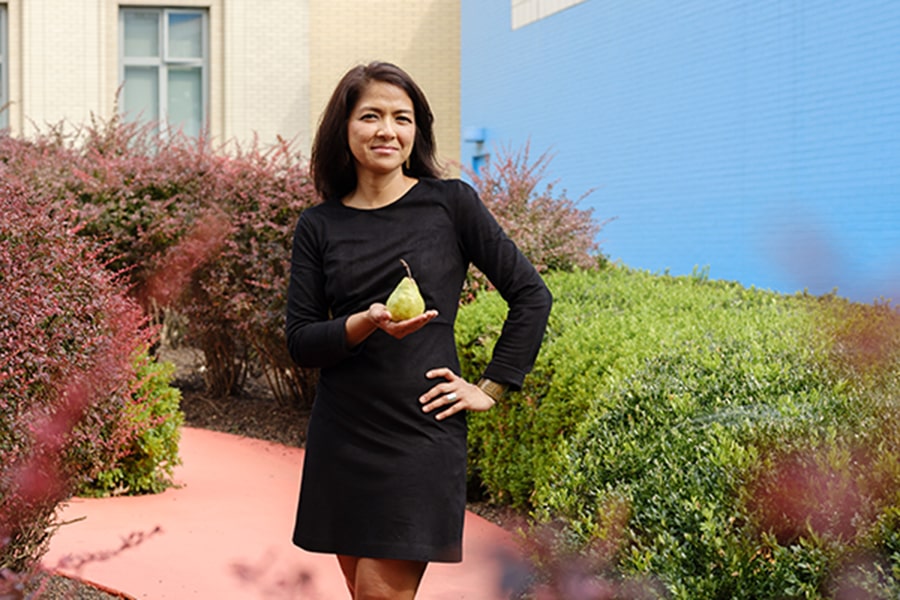
Personal Mention
Alumna Leah Lizarondo, CEO and co-founder of 412 Food Rescue, is joining the Heinz College of Information Systems and Public Policy as an Entrepreneur In Residence. Founded in 2015, 412 Food Rescue is the fastest-growing food recovery organization in the U.S. 412 Food Rescue redirects perfectly good food from entering the waste stream by collecting unsellable yet fresh, healthy and safe edibles from retailers and moving them directly to nonprofit partners who distribute the food. A network of over 4,000 drivers, the largest volunteer food transport network in a single urban region, is mobilized through a mobile app and transports the food from the retailers. 412 Food Rescue's innovative distribution model provides a solution to the food waste problem through technology that mobilizes civic participation. Lizarondo earned her master’s degree in public policy at Heinz College in 2003.
Kathryn Whitehead, an assistant professor of chemical engineering, and Yongxin (Leon) Zhao, assistant professor of biological sciences, have been awarded 2018 National Institutes of Health (NIH) Director’s New Innovator awards. The awards are part of the National Institutes of Health’s High-Risk, High-Reward Research program, which supports ideas that have the potential for great impact in areas relevant to the NIH mission.
 With this award, Whitehead will genetically engineer the human cells in breastmilk for infant disease therapy — something no one has ever done before. With this research, Whitehead’s lab may be able to deliver oral vaccinations for babies instead of shots, tolerize infants to allergens such as peanuts, or treat babies with spina bifida, enterocolitis and other types of genetic disorders.
With this award, Whitehead will genetically engineer the human cells in breastmilk for infant disease therapy — something no one has ever done before. With this research, Whitehead’s lab may be able to deliver oral vaccinations for babies instead of shots, tolerize infants to allergens such as peanuts, or treat babies with spina bifida, enterocolitis and other types of genetic disorders.
 The grant will support Zhao as he develops transformative nanoscale imaging techniques that will allow researchers to see precise “biomolecule maps” in pathology samples. These maps will allow for the comprehensive analysis of complex diseases, such as cancer, infection and immune diseases. He will use the NIH funding to build on Expansion Pathology and create new chemistry and imaging strategies for more informative pathology at the nanoscale.
The grant will support Zhao as he develops transformative nanoscale imaging techniques that will allow researchers to see precise “biomolecule maps” in pathology samples. These maps will allow for the comprehensive analysis of complex diseases, such as cancer, infection and immune diseases. He will use the NIH funding to build on Expansion Pathology and create new chemistry and imaging strategies for more informative pathology at the nanoscale.
 Dannie Durand, a faculty member in the Department of Biological Sciences, is one of 29 recipients of the National Science Foundation’s (NSF) “Understanding the Rules of Life” grants. The grants are part of a $15 million investment by the NSF to address some of the greatest challenges to understanding the living world. The current challenge in biological systems is to assimilate new information into causal, predictive models. “Understanding the Rules of Life,” one of NSF’s 10 Big Ideas, aims to enable discoveries that will allow us to better understand complex interactions and identify relationships that cross scales — in short, the "rules" for how life functions. Using the funds from the grant, Maureen Stolzer, the Durand lab research scientist who is leading the project, will characterize similarities and differences in the processes that result in the appearance of new multidomain proteins in vertebrates and bacteria. Multidomain protein architecture varies between species, as do genomic and cellular properties. Using this comparative framework, Stolzer and Durand will attempt to identify the design rules for multidomain proteins. These rules will provide the foundation for predictive models that link evolution and function. The models can be used to develop applications in health care and protein engineering. Find out more.
Dannie Durand, a faculty member in the Department of Biological Sciences, is one of 29 recipients of the National Science Foundation’s (NSF) “Understanding the Rules of Life” grants. The grants are part of a $15 million investment by the NSF to address some of the greatest challenges to understanding the living world. The current challenge in biological systems is to assimilate new information into causal, predictive models. “Understanding the Rules of Life,” one of NSF’s 10 Big Ideas, aims to enable discoveries that will allow us to better understand complex interactions and identify relationships that cross scales — in short, the "rules" for how life functions. Using the funds from the grant, Maureen Stolzer, the Durand lab research scientist who is leading the project, will characterize similarities and differences in the processes that result in the appearance of new multidomain proteins in vertebrates and bacteria. Multidomain protein architecture varies between species, as do genomic and cellular properties. Using this comparative framework, Stolzer and Durand will attempt to identify the design rules for multidomain proteins. These rules will provide the foundation for predictive models that link evolution and function. The models can be used to develop applications in health care and protein engineering. Find out more.
